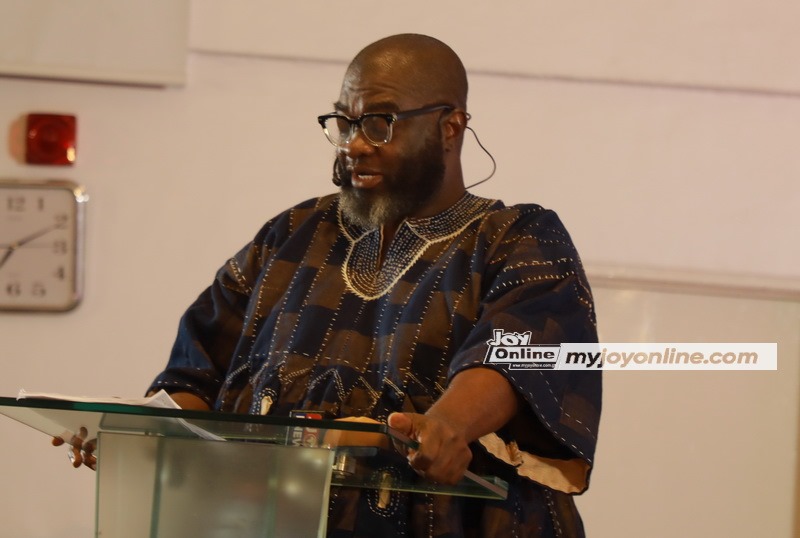ARTICLE AD
Leaked CCTV footage showed several people putting multiple absentee ballots into drop boxes
When alleged ballot-stuffing was caught on camera in a New England city, Donald Trump and his supporters seized on the voting scandal as evidence of a purported wider problem. But experts say election fraud is rare - and that this case stems from the unique and tumultuous local politics.

Some voters in Bridgeport are confused. Others are just plain disgusted.
"It's hard to find out who the heck is telling the truth," says one woman out shopping with her husband near Bridgeport's City Hall.
"We don't vote," another tells me flatly, pausing momentarily on her way to a coffee shop, "because of what's going on."
What's going on is a controversy that has not only upended Bridgeport's mayoral race, but has caught the eye of former US President Trump and others who say voter fraud is a serious problem across the United States.
In September, leaked surveillance video appeared to show several people stuffing ballots into Bridgeport's voting drop boxes.
The alleged box-stuffers included allies of Bridgeport's Mayor, Joe Ganim.
The city leader won the Democratic primary in September over his rival John Gomes by 250 votes, out of more than 8,000 cast, and later eked out an even narrower victory in November's general election.
 Bridgeport Mayor Joe Ganim speaking at a press conference near the city's waterfront
Bridgeport Mayor Joe Ganim speaking at a press conference near the city's waterfront
But the videotape led a judge to rule that the primary results could not be trusted. He ordered another election. And on Tuesday, the Democrats will re-run their primary.
It's a case that has attracted attention far beyond this city of 150,000 people on the north shore of Long Island Sound, about an hour from New York City.
"This is just a 'tiny' part of what's happening in our country with voting," Mr Trump declared in a post on his Truth Social network. "It's all a giant scam!"
Many Republicans continue to believe that widespread voter fraud swung the 2020 election, although the former president has failed to provide hard proof of his claims and numerous lawsuits have been dismissed. Mr Trump's own attorney general said there was no evidence of fraud that could have impacted the result.
Every year in the US, there are a handful of electoral fraud convictions relating to votes cast for candidates from either of the two main parties, though such cases involve a relatively tiny number of ballots.
Experts and political operatives say that the unique circumstances of politics in Bridgeport - rather than grand unified theories of voter fraud - are a much better explanation of recent events here.
"Our elections, by and large, are safe and secure," says Connecticut's top elections official, Secretary of State Stephanie Thomas, a Democrat.
"We have had cases of fraud, as many other states have had," Ms Thomas says. "But we catch them."
Leaked tapes
The showdown between Mayor Ganim and Mr Gomes - who for several years worked under the mayor in City Hall - is just the latest tussle in a political environment that one local newspaper described as "so complicated and splintered by numerous factions and allegiances that insiders compare it to Beirut".
The leaked surveillance footage comes from cameras that were pointed at several absentee ballot drop boxes in Bridgeport.
The judge ruled that two women allied with Mayor Ganim had put multiple ballots in the boxes on up to 15 occasions, in violation of local election laws. In court, both women declined to answer questions, citing their constitutional right to avoid self-incrimination.
The mayor hit back and pointed out that supporters of Mr Gomes had been seen on camera doing the exact same thing.
In many other places around the US, delivering multiple ballots in this way is both common and perfectly legal - a tactic known as "ballot harvesting". It's used by a range of political campaigns and organisations to gather early votes from their supporters.
The Covid pandemic prompted many states to loosen their rules around absentee and postal voting, and allies of the mayor say that postal ballots ensure elderly and disabled voters - Bridgeport has relatively high proportions of both - can participate in the political process.
But Connecticut's rules are much stricter than many other states. Only family members, caregivers - or, in certain circumstances, police officers or voting officials - can handle absentee ballots. The people caught on camera were not authorised to do it.
 Bridgeport City Hall is a bitter political battleground
Bridgeport City Hall is a bitter political battleground
Mayor Ganim's critics - his challenger chief among them - say that the incident has exposed the underbelly of a type of corrupt Democratic party "machine politics" in the city.
It's a charge the mayor vehemently denies.
Outsider or insider?
Mr Gomes arrived in Bridgeport from Cape Verde, an island nation off the west coast of Africa, at the age of nine. He grew up in The Hollow, a working-class neighbourhood of Bridgeport, before forging a business career.
The challenger says that corruption scandals are holding this city back - and he's running as a reformer.
Over lunch at a Portuguese cafe - football and Portuguese news plays on the TVs behind the bar - a steady stream of his friends and supporters come up to greet him.
"These are my roots in the city," he says. "I care about Bridgeport. I am Bridgeport - my kids grew up here. It's made me what I am today."
 Mayoral challenger John Gomes speaks with a local shopkeeper in Bridgeport
Mayoral challenger John Gomes speaks with a local shopkeeper in Bridgeport
Mayor Ganim, the incumbent, has a long and controversial history in local politics. He first took over the mayor's office in 1991, but in the early 2000s was convicted on racketeering and corruption charges and spent seven years in federal prison.
Once out, he went on an apology tour and won back the mayor's office in 2015.
Reached by phone days before the primary re-run, Mayor Ganim said he was committed to transparency, and welcomed the appointment of two state election monitors.
"The videos speak for themselves," he says. "The court found irregularities… we now need to focus on this very important primary."
Complicating the picture is the personal history between the mayor and his challenger.
Mr Gomes supported Mayor Ganim's comeback, and was appointed to a senior administrative post - but the mayor later fired him, alleging that Mr Gomes was ineffective and doled out jobs to relatives.
The mayor called Mr Gomes's campaign a "vendetta" waged for personal reasons rather than a real effort at reform. And he dismissed the charge that Bridgeport's politics are blatantly corrupt.
"It's flattering to say that there's a Democratic machine and press a button and it rolls into power," he says. "But it's just not true."
Lennie Grimaldi, a supporter of Mayor Ganim and a journalist who writes a blog called Only in Bridgeport, points out that both campaigns have requested hundreds of absentee ballot applications in advance of Tuesday's primary.
When it comes to maximising the absentee vote, he says, "both sides do it".
"Politics in Bridgeport is a highly competitive sport," he adds.
'Pattern for decades'
Others see a more systemic problem.
"This has been a pattern for decades," says Jonathan Wharton, assistant professor of political science at nearby Southern Connecticut State University. "The old ways have some staying power."
Over eggs at a café in Bridgeport's downtown, Prof Wharton says reform efforts throughout the 20th Century reined in some of the immense sway wielded over elections by party political machines in big cities across the north-east US.
But Bridgeport, he says, has been a lot slower to change.
 Voters in Bridgeport are not highly enthused about the re-run of the primary contest
Voters in Bridgeport are not highly enthused about the re-run of the primary contest
Republicans in the state, even those that don't buy into Mr Trump's mass voter fraud narrative, have argued for the elimination of drop boxes and called for same-day voting.
Democrats, who control the state legislature and governor's office, have gone the other way, and have started to loosen rules, allowing "no-excuse" absentee voting and, for the first time, early voting locations. Like their party counterparts around the country, they've argued in favour of making it easier to vote.
But the new rules won't come in until November, and pundits expect voter turnout in the mayoral re-run will be low - perhaps less than 20% - because of the cold weather, voter fatigue and ebbing faith in the system.
"You have this malaise among voters where the sense is that no matter who you elect to office, whether somebody who's a reform-oriented politician or somebody who follows the party line, they're all for themselves," Prof Wharton says.
"So what's the point of showing up to vote?"
What's more, if Mr Gomes wins, voters face the possibility of yet another vote - a general election re-run next month.
If there's one thing nearly everyone involved in Bridgeport politics agrees with, however, it's that the situation here doesn't support wider allegations of voter fraud.
Both candidates dismissed the claims. And Prof Wharton, who used to work for a Republican congressman, calls the situation in Bridgeport an anomaly - not only in the US, but within Connecticut.
"This is very provincial," he says. "What's happening here we don't see in many other municipalities. Bridgeport is unique."

DISCLAIMER: The Views, Comments, Opinions, Contributions and Statements made by Readers and Contributors on this platform do not necessarily represent the views or policy of Multimedia Group Limited.

 
 
 
 
 
 
 
 
 

 1 year ago
85
1 year ago
85 

